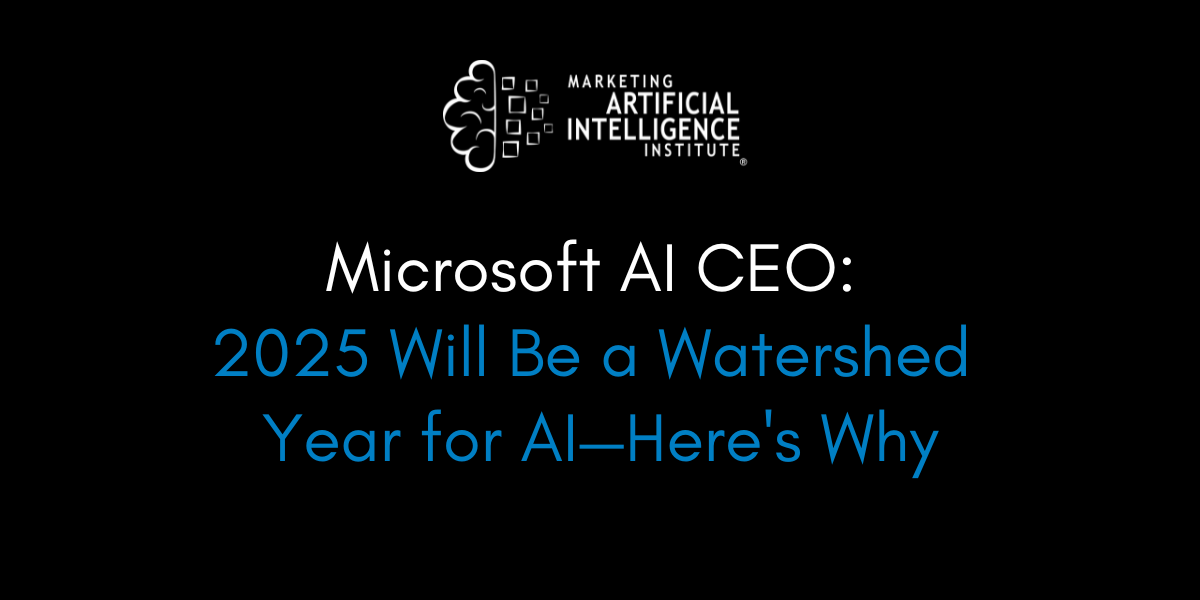Microsoft AI CEO Mustafa Suleyman just dropped some major revelations about the future of AI in a new Masters of Scale podcast interview.
And his timeline for groundbreaking developments is closer than you might think:
We could see AI that can improve itself, remember everything about you, and display emotional intelligence as soon as 2025. Things could move so fast that Suleyman even compares AI to a "new digital species."
I broke down the interview's key insights with Marketing AI Institute founder and CEO Paul Roetzer to understand what's coming—and why it matters—on Episode 122 of The Artificial Intelligence Show.
Who Is Mustafa Suleyman and Why Should You Care?
Before we dive in, some context: Suleyman isn't just any tech executive. As the CEO of Microsoft AI and former co-founder of Inflection (which Microsoft “acqui-hired”), he's a key architect of Microsoft's AI strategy and its crucial relationship with OpenAI.
When he talks about the future of AI, it's not speculation—it's a roadmap.
Five Game-Changing AI Capabilities Coming Soon
1. Recursing Self-Improvement
AI systems will soon be able to identify and fix their own weaknesses, flaws, and hallucinations, Suleyman said on the podcast.
"This sounds awesome on the surface, it also sounds terrifying," says Roetzer. "This is one of the things that the Doomer side worries about...these things develop the ability to recursively self improve, which could enable a fast takeoff where they just become really, really smart, really, really fast."
2. Emotional Intelligence
It's not just about raw computing power anymore. Suleyman believes the emotional intelligence of AI models—their tone, style, and ability to engage—may be more important than pure information delivery.
But Roetzer cautions this is a "very slippery slope," noting the potential for "humans developing unhealthy, deep relationships with AIs that seem very human-like."
3. Vision-Enabled AI Companions
The next frontier is AI that can actually see what you see.
Suleyman emphasizes that the next big step towards true AI agents means giving AI the power to observe your digital environment on your screens and in your browser.
Microsoft has already teased this capability, with their Copilot account recently announcing: "If only your browser could see what I see. Oh wait, Copilot Vision will be able to very soon."
If only your browser could see what I see… oh wait, Copilot Vision will be able to very soon 👀 pic.twitter.com/EtLGyMGPq3
— Microsoft Copilot (@MSFTCopilot) November 1, 2024
4. Permanent Memory
Perhaps the most transformative near-term development is AI with permanent memory—systems that remember everything about their interactions with you.
Suleyman is very confident we’re going to “nail memory” by 2025, which would eliminate the current frustration of AIs "forgetting" previous conversations and enable truly personalized interactions.
5. Bigger and Smaller Models
Last, but certainly not least, Suleyman says the evolution of AI models is heading in two directions simultaneously:
- Frontier models will continue getting more powerful
- Smaller, more efficient models will handle specific tasks
The Window of Opportunity
Suleyman's message is clear: The next few years represent a crucial window for shaping AI's future.
Roetzer agrees with this sentiment, though he notes he doesn't endorse everything Microsoft is developing. "The only way we do what we do...is because I believe we have a possibility of an incredibly abundant future, and I choose to be optimistic about it, despite the concerns and fears and the uncertainty."
The takeaway? Whether you're an entrepreneur, academic, or professional in any field, now is the time to engage with AI's development. The technology is advancing rapidly, but there's still time to influence its direction—if we act now.
Mike Kaput
As Chief Content Officer, Mike Kaput uses content marketing, marketing strategy, and marketing technology to grow and scale traffic, leads, and revenue for Marketing AI Institute. Mike is the co-author of Marketing Artificial Intelligence: AI, Marketing and the Future of Business (Matt Holt Books, 2022). See Mike's full bio.



